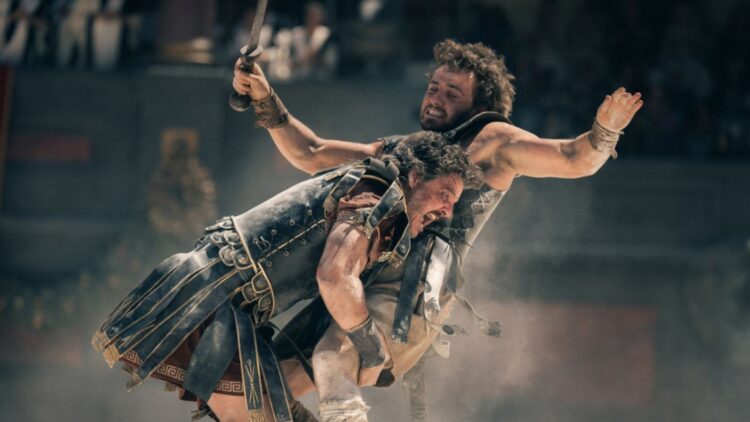

Most men think about the Roman Empire several times a week, if a recent meme is to be believed. With Gladiator II, Ridley Scott brings the era back to life in the way only a teenage boy could imagine it. Historical accuracy continues to be an irrelevance for the director, and who could blame him? Why stick to the facts when it’s so much more fun to have your little freak of an action hero battle hordes of CGI monkeys or partake in a naval battle in the flooded Colosseum? If this decades-in-the-making sequel feels better than the original, it’s because there are no prestige aspirations here––Scott follows the formula of the first to a tee, turning up the dial so each set piece is bigger and stupider than before. There’s no commentary on the senseless nature of the violence being spectated, as there was with the first; if Scott were to pause the film after Lucius (Paul Mescal) bites off a monkey’s arm in battle to once again ask “are you not entertained,” it would likely register as sincere rather than scathing.
The first Gladiator was hardly highbrow, but with its slew of Oscar wins it’s retroactively regarded as a film with loftier ambitions than updating the sword-and-sandal epic for a bombastic 21st-century sensibility. There will be no similar illusions this time around. It’s for the better: reuniting with Napoleon screenwriter David Scarpa, Scott transforms what was previously self-serious material into mischievous dark comedy, just as the pair transformed a biopic about a major historic figure into one where he’s a laughingstock, gleefully pissing off the entirety of France in the process. Unlike Napoleon, however, it delivers on the base-level thrills––and then some––people will be hoping for when they buy a ticket, replicating the structure of the first even as it deviates into an overripe political soap opera.
We open with the mirror image of the first film, introduced to our new Gladiator-to-be––and, unbeknownst to him, son of Russell Crowe’s ill-fated Maximus––fending off Roman Empire forces who have come to claim his adopted hometown in Northern Africa. He’s unsuccessful, defeated by the army of General Marcus Acacius (Pedro Pascal) and taken as a prisoner to Rome, where he’s swiftly bought by slave trader Macrinus (Denzel Washington), a former slave with ambitions of taking over the corrupt city. Macrinus uses his stable of gladiators to mix with high society, scheming to join their ranks even as he appears to just be arranging their blood-splattered entertainment, but with the cocky Lucius he gets far more than bargained for. The young fighter doesn’t harbor any respect for those above him in the food chain, making things complicated when his mother (Connie Nielsen)––who, lest we forget, is the daughter of a former ruler––unexpectedly recognizes him in the crowd. Pushing this even further into soap-opera territory is that she’s replaced Maximus as a lover with Marcus, the man responsible for enslaving him, and Lucius has no desire to get to know his new stepfather.
Crowe elevated his thinly written hero archetype in the 2000 film, electrifying with every cheesy monologue even as there was little meat on the bones of the character itself. He was a run-of-the-mill brooding hero brought to life by a charismatic actor. After an opening battle scene in which any characteristics get lost beneath the carnage, it becomes clear that Gladiator II’s greatest strength might be Mescal’s refusal to let his role be defined in a similarly bland way. He’s a brat with a macabre sense of humor, eager to get revenge on the Empire’s rulers yet more than happy to be the butt of the joke if it’s funny enough. Where his father had a moral compass that was easily digestible to blockbuster audiences, commended within that film for showing mercy on his opponents, Lucius would rather die in front of an audience than be spared by the “Gods” (the twin twink emperors played by Joseph Quinn and Fred Hechinger). He’s the clear hero, yet written with enough depth that Scott and Scarpa risk not having him coming across as un-complicatedly “likable,” which alone makes Gladiator II feel like an oasis in a desert of overly focus-grouped blockbusters. And that’s before we get into a third act which, in this of all weeks, will likely generate some insufferable liberal discourse about the ethics of sympathizing with a hero intent on staging an insurrection, no matter how justified it may be.
This is not a movie designed to be thinkpieced––I suspect Scott would much prefer it if you shut your brain off altogether. And this lack of critical thinking needs to be extended towards the Macrinus subplot, which is played purely as surface-level scheming, even if the idea of a former slave machinating his way to rule the Empire sounds like it should have something to say about race and class. Gladiator II would, of course, be a much better film if it dared to analyze this, but we are still a cut above the recent crop of Talented Mr. Ripley imitators by Washington’s sheer presence alone. His character’s journey is all surface, but what an irresistible surface it is. Who needs commentary when you could have one of the best in the game hamming it up as a maniacal plotter, orchestrating his way to the top of the food chain, being whoever he wants the person in front of him to see him as? It’s too broad to be read as analogous to “code-switching”––although there is a lot of fun seeing him accentuate various queer mannerisms when sharing scenes with Tim McInnery’s Thraex––and Scott never pretends that this arc is attempting anything as lofty as social satire. But it easily surpasses the likes of Saltburn thanks to self-awareness about its modest ambitions. This is a movie that knows it has rocks for brains and wouldn’t dream of convincing you it had any meaningful insights on how class, race, gender, and even sexuality function in a conservative society.
Naturally, this approach will frustrate many who hoped the follow-up to a Best Picture winner would have some food for thought; writing this during an embargo, I can only assume consensus will be a lot less warm than the frenzied initial reactions. When approached as the big, dumb spectacle its much-trumpeted lack of historical accuracy had long teased, Gladiator II proves easier to embrace.
Gladiator II opens on Friday, November 22.
The post Gladiator II Review: Ridley Scott’s Sequel Bests Predecessor By Going Dumb first appeared on The Film Stage.



